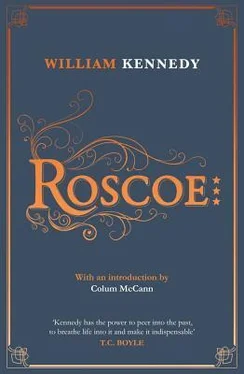“We had a big buy-up in ’33,” Patsy said.
“I remember that,” Roscoe said, “but not Elisha.”
“You were in Kentucky, screwing around with racehorses,” Patsy said.
“It happened fast,” Bindy said. “Income from the madams fell two thousand in two weeks, two owners died, one left town, and three houses went dark. I told Patsy we oughta own them places, so we bought ’em. And kept buyin’.”
“Elisha bought them?” Roscoe asked.
“He organized the investors,” Patsy said.
Bankers panting to do business with the city could prove their sincerity by investing in whorehouse real estate, and lawyers could do the same by representing the whores when they were periodically arrested to put their pictures in the files, and to justify the Vice Squad’s existence. Within two months the neighborhood of the whores was stabilized through dummy corporations, and whoredom also had new friends at court.
“Roy said Elisha owned the houses,” Roscoe said.
“He never owned ’em,” Patsy said.
“I wonder if his name is on any deeds.”
“He used front people.”
“But can they prove he was behind it?”
“I don’t know how,” Patsy said. “And who’s gonna indict a dead man? They want us up against the wall for Alex’s re-election. What I don’t get is where Roy Flinn borrowed the balls to take us on.”
“Maybe he wants to get back at us for what happened to Artie.”
“Artie?” said Patsy. “That’s fifteen years ago.”
“Artie died six months ago in Poughkeepsie,” Roscoe said. “Maybe it affected Roy. He didn’t even want a death notice in the papers.”
“Where’s his leverage?” Patsy asked.
“He’s cozy with the Governor’s gang, so maybe he feels protected,” Roscoe said. “Also, his paper’s heavy with ads from outside Albany — summer hotels, nightclubs, restaurants, dude ranches that don’t worry about pressure from us.”
“Send a fire inspector down to that firetrap of his,” Bindy said. “Make him spend thirty grand to bring it up to code. He’ll come around.”
“Bad scene,” Roscoe said. “Harassing the press, and the patriotic press at that. There are other ways.”
“Name a few,” Patsy said.
“Take over his block. You did it with the whorehouses.”
“The whole block?”
“It’s a small block. Condemn one side to widen it for improved traffic flow, put in new sewer pipes. Pay Roy a quarter of what his building’s worth, settle sweet with the — what? — three, four other landlords? Then we own the block. When Roy is gone and we’ve got the property, cancel the project.”
“Condemn the block,” Patsy said. “Goddamn it, Roscoe, you are one twisted, beautiful sonofabitch.”
“That’s what my mother always said.”
“You want some chicken?”
“Of course I want some chicken.”
“The gravy’s good.”
“Life without gravy is not life,” Roscoe said.
As they went back to the kitchen for lunch, O.B. called to report that Roy Flinn and his lawyer were filing a third-degree assault charge against Roscoe. Roy’s eyebrow and lip were badly split and his nose was broken.
“Have Rosy open court at two o’clock for the arraignment,” Roscoe told O.B. “Tell him to set my bail at four hundred to make Roy feel good.”
“You’ll be here, like an upstanding citizen,” O.B. said.
“Of course I’ll be there. Two o’clock. On the dot.”
Patsy looked at his watch. “Two o’clock’s too early,” he said. “You gotta eat your chicken.”
“Make that three o’clock,” Roscoe told O.B.
In Police Court, Roscoe could hear Roy Flinn’s nose throbbing under its bandage as they stood before the bench to hear Rosy Rosenberg, whom Roscoe and Patsy had put on that bench, read the law relating to assault, and then set bail at four hundred dollars, “in default of which you will be remanded to Albany County jail.” Roscoe smiled at Rosy, waved at Roy, and paid the four.
Horse Talk
They were in the east parlor of Tivoli when Gilby read the item about Pamela in the Sentinel and asked Veronica, “Is it true she’s my mother?”
Veronica told him, “I’m your mother. She gave you up before you were born.”
“Now she wants me back.”
“She can’t have you, and she won’t get you.”
“Who’s my father?”
“He’s dead,” Veronica said. “You didn’t know him.”
“I don’t know anything,” Gilby said, and he went out onto the porch.
“Where are you going? Listen to me!” But he kept walking. She caught up with him. “Did I ever tell you what your Grandma Julia used to say? ‘Patience and perseverance took the snail to Jerusalem.’ ”
Gilby shrugged.
“When she was a girl,” Veronica said, “she’d throw a penny off the bridge into Washington Park Lake and say, ‘I’m going to have a big, big house and a butler named Johnny,’ and she did.”
Gilby stared at her.
“She only went to third grade in school, but she owned the world. I’m talking about overcoming problems. Do you see that? It’s like breeding a champion Thoroughbred. Your father and I always wanted that for you. You have money and brains and love, and you can’t give that newspaper story any importance. What does the stupid Sentinel know about champions?”
Gilby went onto the back deck, vaulted the railing with one arm, and ran down the drive toward the stables.
“Gilby!” Veronica yelled. “Listen to me! I want to tell you about this.” But he would not look back. She went down the steps of the deck and ran after him as fast as her high heels would allow. When she reached the second stable, he was saddling Jazz Baby. Ticky Blake, who for twenty-two years had trained Fitzgibbon horses, stopped brushing Mr. Bantry, Veronica’s bay, and listened.
“Gilby, your life won’t change,” Veronica said. “I won’t let it. I’m a strong person. Do you believe I’m strong? Well, I am, and we have powerful friends in all the courts, and I have more money than your aunt does to fight this, and I’ve won every fight I ever had with her.”
Gilby, in his white sneakers, stepped up into the saddle.
“Gilby,” Veronica said, “talk to me.”
The boy nudged Jazz Baby onto the road and into open pasture, toward the trail through the western woods.
“Saddle Mr. Bantry for me, Ticky,” she said, and she ran to the house and up to her bedroom and pulled herself out of her dress and slip and shoes. She stepped into her riding britches and boots, then shoved her arms into a pullover shirt, and double-timed down the stairs with her hair flying, a laissez-faire beauty when she wanted to be. She mounted Mr. Bantry and rode at a gallop into the woods after the boy, praying to her trinity of Gods — Jewish, Anglican, Catholic — that she would not lose Gilby, because she absolutely could not lose another thing, not one. Yet she seemed to be galloping toward more loss and new shame, the press again prying just as it had when Elisha was named a profiteer in the crazy baseball pool and he fled with her to Europe from a scandal that never really amounted to much, so supported was he by clergy and politicians of every stripe. Elisha, grand husband, you’re gone, and you left Veronica in wicked confusion: grief still green but waning; men hovering at the wake, eyes probing her widowed beauty for just one wrinkle of welcome. But Veronica rejected every eye, wants no affection while she still cries in the half-empty bed. She’s fighting the fears her loneliness generates, but they are smothering her.
She rode the trail to where it came out of the woods at Lake Tivoli. Maybe Gilby would go to the fishing shack to be there with his memories of Elisha. She should have told Gilby the history of his birth, as Elisha wanted, but she’d waited for him to come of age, so he could handle such disturbing rejection. They told him only that he was adopted, his parents’ names unknown to them.
Читать дальше












